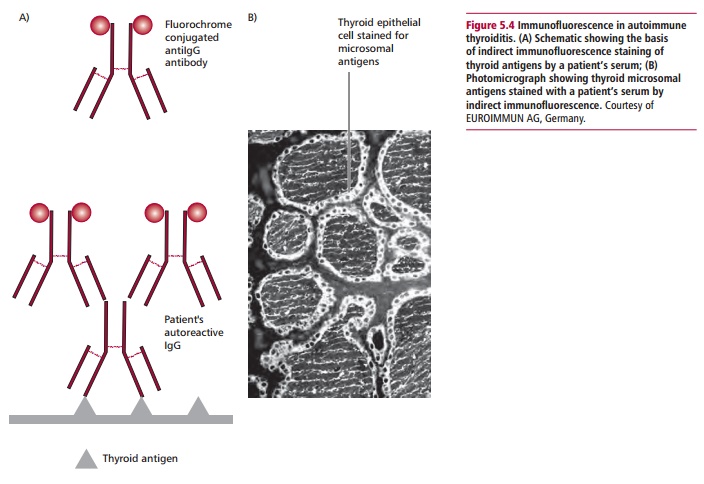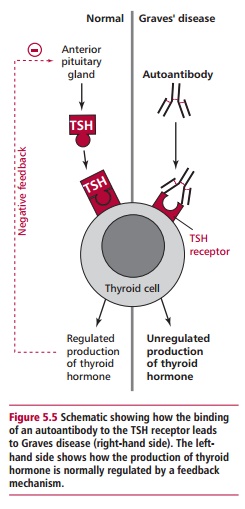Chapter: Biology of Disease: Disorders of the Immune System
Autoimmune Disorders Affecting Endocrine Glands
AUTOIMMUNE DISORDERS AFFECTING ENDOCRINE GLANDS
Autoimmune disorders of the thyroid gland are among
the most common autoimmune disorders. Some will be discussed. Autoimmune
thyroiditis, also known as Hashimoto’s thyroiditis, results in hypothyroidism
and myxedema. The disease presents, typically, in women of middle age who are
overweight, lethargic, constantly feel cold, are constipated and have coarse,
dry hair and skin. The thyroid is swollen with a generally painless goiter, but
which has a rubbery consistency when palpated. A biopsy of the thyroid shows
infiltration with both CD8+ and CD4+ T lymphocytes that progressively destroy the
thyroid gland. Patients also have antibodies to thyroglobulin and to thyroid
peroxidase, which can be determined by

ELISA . Immunohistochemical techniques can show the
patient’s serum to have antibodies that bind to microsomal antigens in sections
of normal thyroid (Figure 5.4).
Patients may be given thyroxine to treat the myxedema, and thyroidectomy may be
required. The prognosis for patients with Hashimoto’s thyroiditis is good.
In Graves disease, patients suffer symptoms of thyrotoxicosis:
are thin, have a high resting pulse rate, constantly feel hot, have bulging
eyes, or exophthalmos, due to growth
of tissue around the orbit of the eye and may suffer diarrhea and general
agitation. They have nodules in the thyroid that are foci of infiltrating T
lymphocytes. Low levels of antibodies to thyroid microsomal antigens are seen
in the plasma. However, more than 90% of patients have antibodies to the
thyroid stimulating hormone (TSH) receptor on the surface of thyroid cells.
These antibodies bind to the receptor and stimulate the production of thyroid
hormone (Figure 5.5). This production
is not regulated by the usual negative feedback mechanisms leading to the
disease symptoms. Graves disease may be treated successfully by destruction of
thyroid tissue. This can be achieved by its surgical removal or by giving the
patient radioactive iodine that becomes concentrated in the thyroid. When women
with Graves disease are pregnant, autoantibodies to TSH cross the placenta and
the baby is born with thyrotoxicosis. Urgent treatment is required but, in
time, the baby recovers as its levels of maternally derived antibodies drop.

Both insulin dependent diabetes mellitus Type 1 and
Addison’s disease are discussed extensively. The former is caused by an
autoimmune destruction of the insulin-producing cells in the pancreas; the
latter by autoimmune damage to the adrenal cortex. Both diseases are fatal
unless treated by replacing the missing hormones.
Related Topics